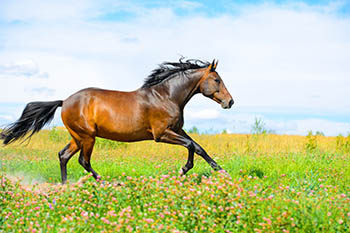Taking a Shot at Equine Vaccinations

Spring is the time to vaccinate or revaccinate horses. Which shots do they need each year and which ones could be optional?
When establishing a vaccination schedule, make sure to factor in time for the horse’s immune system to respond. Some conditions may require a series of shots to build protective immunity. Also consider what’s most important based on the size of your herd, travel requirements, age and geographical location. Balance the risk of infection with the risk of over-stimulating the horse’s immune system.
While many vaccines are available at local retail outlets or feed stores, vaccines must be properly stored to ensure they maintain their efficacy. Keeping an ongoing dialogue with a veterinary practitioner is important to ensure products have been properly handled and stored, provide optimal immune coverage and are not outdated. While some horse owners opt to administer vaccines themselves, veterinarians are more experienced with safe injection techniques that incur the least risk for side effects.
Your horse’s or herd’s vaccination regimen should be based on the following criteria:
- Geographic location: Are you in a part of the country with a longer mosquito season?
- Daily routine: Do you frequently travel to shows or competitions? How frequently is your horse or herd exposed to other horses?
- Age: Equines under age 5 are more susceptible to equine herpesvirus and West Nile virus, while older horses may show changes in their immune response as they age.
- Breeding mares may need additional protections. Revaccinating four to six weeks prior to foaling can offer higher levels of antibodies in colostrum to protect foals during their first months of life.
Core vaccinations versus risk-based equine vaccinations
The American Association of Equine Practitioners identifies the following core vaccinations for horses in North America:
- Eastern equine encephalitis/Western equine encephalitis (EEE/WEE): Annual revaccination in spring prior to peak mosquito season. May consider 6-month revaccination in endemic areas
- Rabies: Annual booster any time of year
- Tetanus: Annual vaccination any time of year
- West Nile virus (WNV): Annual revaccination given in spring
Other risk-based vaccines include:
- Anthrax: Annual revaccination in endemic areas for bacteria found mainly in Southwest
- Botulism: Annual revaccination can vaccinate broodmares to protect foals from shaker foal syndrome but doesn’t protect against other forms of botulism
- Equine herpesvirus: (EHV): Annual revaccination unless at higher risk, in which a 6-month revaccination is recommended including performance or show horses, horses under age 5, horses on breeding farms or in contact with pregnant mares
- Equine influenza: Annual revaccination for horses at low risk for exposure. Horses in more frequent contact with others need a booster every six months
- Equine viral arteritis (EVA): Prior to breeding, horses should be tested and confirmed negative for EVA antibodies. This virus can cause abortions, so annual vaccination is recommended three to four weeks prior to breeding season
- Potomac horse fever (equine monocyctic ehrlichiosis) (PHF): Semiannual to annual revaccination in endemic areas. Disease can occur in many areas of the country, but risk is typically localized
- Rotaviral diarrhea: Recommend vaccinating pregnant mares to protect foals
- Strangles (Streptococcus equi): Semiannual to annual vaccination AAEP recommends vaccination where history of outbreaks or for horses at high risk of exposure
Equine vaccination side effects
Side effects of vaccination may include muscle swelling, stiffness, fever and lethargy. Localized tissue reactions also may occur. AAEP suggests that vaccine lot and serial numbers be noted in all vaccination records and that veterinarians report all adverse reactions to the vaccine’s manufacturer.
AAEP further recommends that staggered administration schedules can be beneficial when multiple vaccinations are required.
Contact your Covetrus representative for information about equine vaccinations and injection products at 855.724.3461.
Sources:
http://www.horsechannel.com/horse-experts/horse-vet-advice/giving-vaccinations.aspx
https://practicalhorsemanmag.com/health-archive/shots-21447
http://www.vetmed.ucdavis.edu/ceh/local_resources/pdfs/VaccinationGuidelines-2015.pdf
https://thehorse.com/128621/vaccination-side-effects/
https://aaep.org/guidelines/vaccination-guidelines/adverse-reactions


Working Here
Our team members are encouraged to be the best they can be... at Covetrus we believe we impact one another.
Learn MoreNews & Events
FDA Cautions Pet Owners Not to Feed Texas Tripe Inc. Raw Pet Food Due to Salmonella, Listeria Monocytogenes
The U.S. Food and Drug Administration is cautioning pet owners not to feed their pets any of the Texas Tripe brand raw frozen pet food listed below because several samples of Texas Tripe raw pet food have tested positive for Salmonella and/or L. mono.
Careers
Are you looking for a place to let your talents shine? At Covetrus, we help our practitioner customers better serve their patients and take pride in providing the best customer experience possible. Search our open positions to see our available opportunities.
Newsletter
Stay current with what’s going on with Covetrus, subscribe to receive our newsletter and email communications. Subscribers will receive the latest information in practice management, sales and marketing, animal health, and more.



-3-(1).png?sfvrsn=2d806d73_0)

Leave a comment